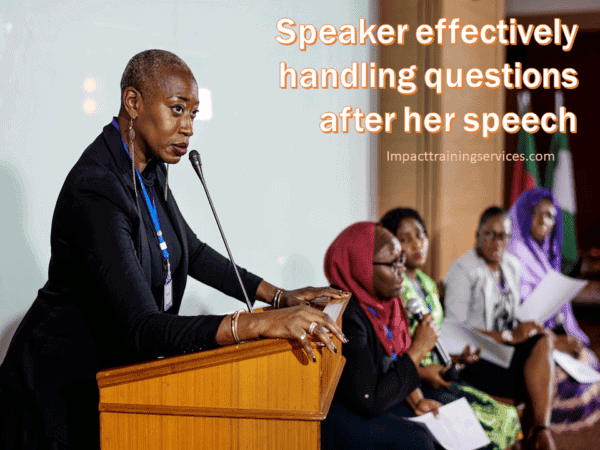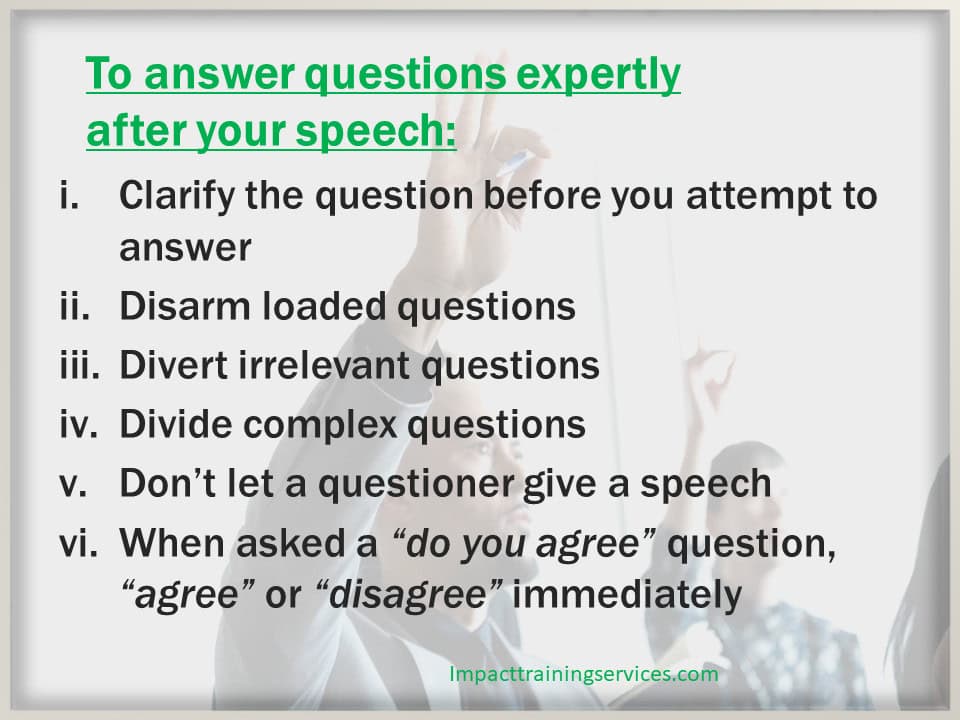
Last updated on October 10th, 2025 at 11:52 am
How To Expertly Handle Questions After Your Speech
- Home
- How To Expertly Handle Questions After Your Speech

At my recently held successful workshop “Public Speaking for Everyday Business People” when we were discussing fears around public speaking, one participant emphatically replied “how to handle questions after your speech!”
Many others agreed and I totally get that. After all glossophobia can be serious.
Not being able to expertly handle questions after a speech is something that seems to scare even potential Top Level Speakers.
Have you ever noticed this?
The speaker delivers an exciting speech. There’s thunderous applause and arms are waving in the air. They are owned by people with burning questions requiring helpful answers.
But fear grips the speaker at that moment and they cannot handle questions effectively, if they manage to answer at all. So they end up undermining an otherwise great presentation.
But that does not have to be your story.
Even more so because as a small business owner, if you want to connect and influence, there are several reasons you need public speaking skills.
If you hang with me just a little longer, I will give you some easy strategies that will reduce your dread and help you handle questions after your speech just like a pro.
Let’s dive in.
1. Expect questions and prepare for them
Even though many speakers know well in advance that they should invite the audience to ask questions, they fail to prepare and practice for this section.
How can you handle questions expertly or skillfully if you don’t prepare for them?
And, there are several things you can do to prepare to effectively handle questions after your speech.
Here are a few:
1. For difficult questions, I like to imagine an enemy in the back of the room shouting questions at me. I imagine they really want to destroy my presentation. So, I try to come up with questions that I would ask if I were in their place.
2. You can also make your presentation to your friends or colleagues and ask them to come up with questions as if they were your real audience.
3. As you deliver your speech, listen to areas that sound weak or unclear to you and anticipate questions around them.
4. Also notice the point (s) at which any side conversations, headshakes or agitation occurs and expect questions coming from those areas.
When you prepare for questions in this way, it not only helps you to handle questions expertly, it also helps to reduce the degree of uncertainty and fear you feel around answering questions.
And if that is not enough, it also builds your overall public speaking confidence, even before you speak.
2. Don’t be defensive or aggressive about questions
Sometimes because you’re afraid and just want this questioning thing to be over, you become defensive or even aggressive about certain questions.
This is especially so, if you judge the questions to be malicious or hostile.
But this does not serve your purpose and can derail your otherwise well-prepared speech.
Instead, be especially polite and have an attitude that communicates that you welcome questions and appreciate the opportunity to answer them. Actually, this is a good time to be strong and assertive.
Remind yourself that there are no stupid questions and stick to the tips in #3 below as much as possible for every question. In this way you will handle questions effectively.
Just between me and you, on your way home, in the car, with the windows rolled up and the doors locked…that may be the time for another attitude altogether!
Remember…appearing defensive and or aggressive can send the message that you resent questions and you did not prepare yourself to answer them.
3. Learn how to handle questions expertly

Now we are at the crux of the matter – actually handling the questions after your speech.
In other words, you can’t prepare and all that and then answer the actual questions poorly.
So here are some useful strategies to help you with that.
i. Clarify the question before you attempt to answer
Repeat it in your own words, if necessary. If you don’t know the answer, admit it, promise to research it and get back to the questioner. Take their contact info and get back to them as promised.
ii. Disarm loaded questions
They’re out there. Members of audiences whose sole purpose is to try to trip you up with a question based on false premises or baseless assumptions.
Politely maintain your position. You may also ask the person to explain the question and share any facts they have on the matter.
iii. Divert irrelevant questions
These questions come from persons whose motives are similar to those described at #2 above. They are not related to the topic and the motive of the questioner might be obscure.
Even if you know the answer, politely ask the person to explain how the question is relevant to the subject at hand.
iv. Divide complex questions
These are the questions that may have three or more parts. Divide them up and answer each part individually. This demonstrates that you can answer questions effectively and also aids your audience’s understanding as well.
v. Don’t let a questioner give a speech
This may be difficult to handle tactfully. If you interrupt the person, some members may accuse you of shutting down the person. If you don’t, you may be accused of letting the person take over. Use your judgement but be firm and polite.
vi. When asked a “do you agree” question…
Answer directly “yes” or “no” and then back up your answer with facts. Do not attempt any long rambling, evasive answer.
4. Know what to do when there are no questions
When you prepare to handle questions effectively, you should also prepare for the eventuality that questions might be slow in coming.
In that case, you can prompt the audience by using the YMBT technique.
This is when you introduce a question by saying “You may be thinking…” and then you expand on some aspect of your speech that you believe might be of concern to your audience. This usually has the effect of generating much discussion and questions from the audience.
You can also ask and answer some questions you would have prepared just for this purpose. A good way to introduce such a question is by saying something like, “if I were in your place, I might ask me…”.
There are several reasons why there may be no questions when you ask for them. The audience just might be suffering from their own fear of public speaking. Recognize this and prepare for this eventuality.
5. Be sure to end the session on a positive note
I have seen this happen more times than I care to recall.
A good speaker gives a great presentation. And then s/he allows themself to be caught up in a senseless, power play argument with a member of the audience. Then in vexation, they declare the session closed.
Really?! If you want to know the effect of this, listen to the conversations after the speech.
All the audience will be talking about is how rude and ignorant the speaker was towards the particular questioner.
All because s/he did not answer the question effectively.
A good way to end the session is to signal that you’re bringing the session to an end.
Inform the audience that you’re taking only one or two more questions. It is important to make this announcement with enough time to answer any subsequent questions properly.
Take these questions from persons who have not spoken before and if possible, take one from a male and one from a female.
Thank the audience for their questions. Mention briefly how their questions have helped you to improve their understanding of your point of view on the topic.
Ending with a smile and a relaxed attitude just about nails it.
I cannot emphasize enough that if you don’t end the questions and answers session on a positive note, you run the risk of undoing all the great work you did with the entire presentation.
Your next step to “handle questions effectively”…
Answering questions effectively is an integral part of your presentation.
It’s also an opportunity to connect more deeply with your audience. This increases your credibility and trust with the audience as well as their willingness to accept your ideas or buy your product and services.
What I want you to do now, is to take these 5 strategies and study them, practice them and ask people you trust for feedback. In other words, make them part of how you practice your speech.
You need to clearly understand the importance of learning how to skillfully handle questions after your speech. This will really reduce the amount of fear and uncertainty you have around public speaking in general.
If you can do this, then I’m talking to the next BIG influencer…



